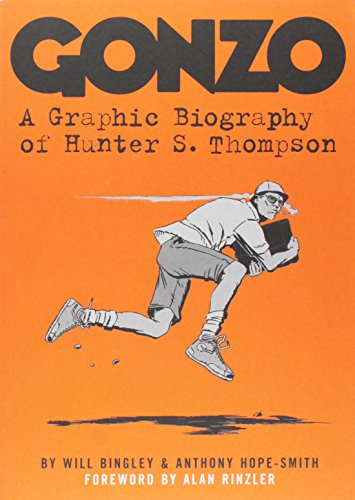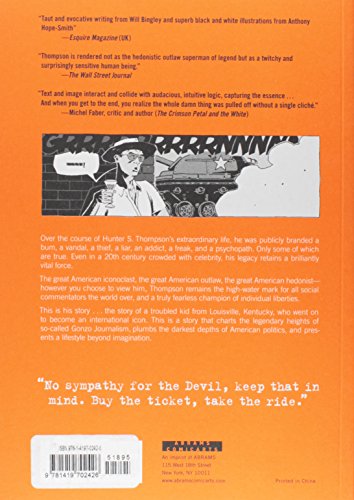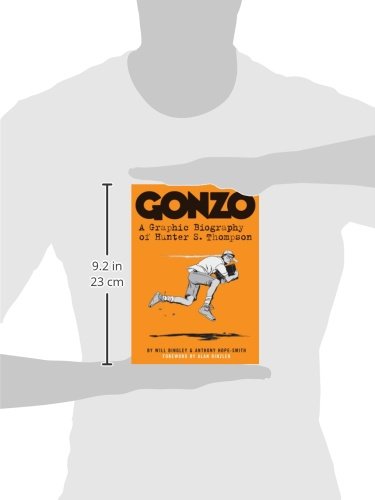Customer Services
Copyright © 2025 Desertcart Holdings Limited
Desert Online General Trading LLC
Warehouse # 7, 4th Street, Umm Ramool, Dubai, 30183, Dubai




Full description not available
C**D
I liked it. If you like Hunter Thompson I think ...
I liked it. If you like Hunter Thompson I think you will too.
M**N
Great Idea... Poor effort
I'm such a huge HST fan that I impulsively bought this book the moment I say it, and I wish it was as good as its cover, but it's not. If I can, I'll be returning it.The book seems like it was done by people with only second or third hand knowledge if the subject, like they based their portrayal on bad movie characatures and Doonsberry cartoons. The story's don't seem to get far enough into Thompson's life to be interesting, the factual errors will drive superfans crazy and the art is poorly done. Save your money and stick to stuff actually written by Thompson, or at least by people who know how to tell a story.
J**P
A must have for the graphic novel collector or Thompson fan.
A quick, concise, and visually appealing synopsis of the life of one of America's most iconic authors. Adds a bit to the general perspective on HST.
E**T
Gonzo - great gift, great read!
this was a gift for my boyfriend, he loved it! he's a big hunter fan & very into his graphic novels so this was a perfect choice for him!
F**D
comic book
Great price for such an awesome comic that came in a timely manner and in good condition.
D**S
Not Just a Graphical Bio -- a Statement on Thompson's Life
This is more than just a graphic biography — the authors have a point to make about Thompson’s life and work. It’s often said that his greatest work came early, in Hell’s Angels, Fear and Loathing in Las Vegas, and in his articles on political/cultural topics, especially on the 1972 election campaign. This book takes a similar view and adds some color on his inability to recreate some of those early great works.The graphics themselves are clean and well-designed to set the mood of Thompson’s hectic, scattered, and often depressed life. The two images that stand out are, as on the cover, Thompson in full flight to or from somewhere, and then in a kind of deflated contemplation, reflecting on things around him going in ugly directions.The text varies between a first person narrative, as if Thompson were speaking from the grave in reflection on his life, and a present-tense presentation of events in their time.All of Thompson’s life here has a kind of accidental haphazard quality to it. The constant is his commitment to journalism. His commitment was real and deep, but the forms it took went it some odd directions, sometimes spectacularly successful but with a cost.Thompson was writing a serious article on the death of journalist Ruben Salazar in a Chicano organized march against the VietNam War at the same time that he was writing the piece on Las Vegas and “the American Dream.” He calls the Las Vegas story “a fun thing”, “not a factual story . . . but maybe a true one.” It seems to have taken precedence over a more traditional journalistic focus on events and facts, a way to express and show something that couldn’t be shown in specific facts — fiction was a better way to show the truth.He had hit on something, and it was a huge success. What followed was different and deflating — the election of 1972. Thompson was deeply invested in the McGovern campaign. The only way McGovern could win against the monster Nixon was to draw on a new source of votes, the young vote, impassioned by opposition to the war. And Thompson committed himself to helping to make it happen.It didn’t happen. And now there was Nixon. It was a moral defeat. A defeat for the idealism that had survived through the war and the emptiness of the American Dream in Vegas.It all seemed to end then. Thompson’s wife Sandy left him in 1980. Here, in the book, the 80s are a blank. And in the 90s, Thompson’s life has deteriorated — he’s angry, frustrated, and unproductive. He can’t recreate the time or the greatness of Fear and Loathing, and, for that matter, he’s no longer living the life of Hunter Thompson, committed political journalist, but the life his success almost curely created, the anti-hero life of Raoul Duke.Alan Rinzler, Thompson’s editor for some of his best work, says in the Foreword to the book, “I’m sorry to see the spectacle of Hunter as the King of Gonzo — a brain-addled, angry, deeply depressed, self-destructive lout — has prevailed in the popular consciousness while the real story of this ground-breaking prose artist and investigative journalist has all but disappeared.”Rinzler is right, and I can’t help but think that some of the blame at least falls on us as Thompson’s readers, reveling in the Raoul Duke character and demanding that Thompson be Duke and give us another Fear and Loathing in Las Vegas, instead of the guy that wrote uniquely insightful political and cultural commentary. We should keep reading Fear and Loathing in Las Vegas -- it's truly a great and innovative work -- but I really wish we had the author of things like his article on "Hashbury" or his 1972 campaign articles around to help today.
C**R
Five Stars
awesome book, fast shipping.
E**N
Gonzo
"I want you to keep in mind that I'd just as soon not be dismissed as some drug-addled clown." While this question of image and public perception isn't one that troubles the majority of us, it was certainly an issue that plagued Hunter S. Thompson. By turns described as the great American iconoclast, the great American outlaw, the great American hedonist and, depressingly far less regularly, the great American writer, Thompson carried for years a justified fear that he had succeeded best in becoming a caricature of himself. It's true that the legend very nearly eclipsed the man. Despite his fairly prolific literary and journalistic output, Thompson is still, even after his relatively quiet final years and untimely death, best known for his excesses rather than for his creativity and innovation. With Gonzo: A Graphic Biography of Hunter S. Thompson Will Bingley and Anthony Hope-Smith aim to redress this fact by offering an account of Thompson's life that highlights those achievements and events of which the man himself was most proud.After a brief introduction, Gonzo begins properly with the incident of the mailbox that will be familiar to readers of Thompson's Kingdom of Fear. This act of childhood rebellion and the defiance of authority that followed it were considered by Thompson to be the defining moments of his life, the moments in which the chaotic and rebellious pattern of his adulthood was begun. What follows is a chronological whistle-stop tour through Thompson's life that takes in all of his newsworthy moments, including the launching of his career as a journalist, his time in Puerto Rico, the fateful visit to the Kentucky Derby, his time riding with the Hell's Angels and hanging out with the Beats, his war of words against Nixon, his political campaign to be elected Mayor of Aspen, and his ultimate arrival at literary success and celebrity status.Gonzo is generally well-written by Will Bingley although there are many points in the book where greater use of dialogue and text would have been appreciated. It is actually a very quick novel to read since it relies very heavy [more so than the majority of recent real-world graphic novels] on the illustrations rather than on the written word. The majority of the panels are accompanied by only a few words or a sentence. This often works well as the art is so good in Gonzo but the book would have been even better if Bingley had added more text to explain Thompson's motivations and actions during many of the key episodes of his life. Gonzo aims to be an accurate account of the real Hunter S. Thompson rather than a rehash of the myth and so it is a real risk to just let big events play out without discussing what was really inspiring Thompson at the time.Bingley has produced a good chronological account of Thompson's life that helps to clarify all of his toing and froing and to illustrate how he developed as both a writer and as a person. It is a generally thorough account although there are a couple of noticeable omissions. First, the 80s and 90s are only given a page each and, although Thompson was certainly not producing his greatest work during his period, this is woefully inadequate. It would have been better to have a longer book that detailed Thompson's despair during those two decades about being trapped in his own image, his recycling of old material and also his politics and the highpoints that did occur [for example, the filming of Fear and Loathing in Las Vegas]. By concentrating on the most productive and `entertaining' period of Thompson's life, Bingley is once again risking writing a biography of Thompson the myth rather than Thompson the man. Secondly, there are a few important characters from Thompson's personal life that are either underrepresented in the book or not featured at all, most notably Thompson's second wife Anita and his son Juan.Despite, or perhaps because of, Thompson's colourful life, Anthony Hope-Smith has chosen to illustrate Gonzo entirely in black and white, and shades of grey. Hope-Smith has produced an excellent `version' of Thompson that is noticeably different from the Doonesbury persona and the illustrations of Ralph Steadman. His Thompson is vital and explosive and even on the quieter panels seems to capture the frantic way in which Thompson lived his life. His supporting characters are realistic in the main and their appearance is in-keeping with the text, although when famous faces [for example Bob Dylan] appear there is a tendency for them to be in their clichéd [or perhaps iconic?] outfits and poses which are not always appropriate to their position in Thompson's life story.The Foreword by Alan Rinzler is an interesting addition to the book. Rinzler was Thompson's editor for all of his earlier [and best] books and is at pains to point out that he and Thompson had a professional relationship rather than their being firm friends. However, Rinzler knew Thompson well, which is not to say that he particularly liked him as a person, and so can write authoritatively about his work. The legacy left by Thompson is a puzzle to Rinzler too: "Why isn't Hunter S. Thompson taken more seriously? As his editor and literary goad for 35 years over four of his best books, I'm sorry to see that the public spectacle of Hunter as the King of Gonzo - a brain-addled, angry, deeply depressed, self-destructive lout - has prevailed in the popular consciousness while the real story of this ground-breaking prose artist and investigative journalist has all but disappeared." This really is a puzzle since, when he was on form, Thompson really was exceptionally good at what he did. Rinzler has justifiably harsh things to say about the originally and worth of Thompson's later works and it is clear that, despite their personality clashes, he had great respect for Thompson's literary talent and so feels disappointed and almost let down by what Thompson allowed himself to become. The insight that Rinzler is able to provide into the life and character of Thompson is informative in itself and also serves to illuminatie Thompson's motivations and self-view.Gonzo is a great, innovative biography of a great, innovative man. Hunter S. Thompson lived a truly extraordinary life and despite the complications that surround his image - whether he is seen as author, liar, freak, bum, addict, psychopath or visionary - he was one of the most significant figures of 20th century American letters and so, in his books and articles, has left an immense and important legacy. Always remember: "No sympathy for the Devil, keep that in mind. Buy the ticket, take the ride."
R**D
Disjointed and uncoherent as Hunter's writing without the charm
The life of Hunter S Thompson is interesting for readers. Often depicted as a crazy drug writing hoodlum with an obsession for guns, politics, and of course Fear and Loathing, it is difficult to pull away that mask to see what Hunter is really like.This book doesn't really clear things up nor is it a comprehensive biography of Hunter's life. Documenting his younger days as a troubled child to his unfortunate suicide, everything inbetween is as jarring as his prose. The story flits to each major life moments of Hunter's life becoming difficult to follow and without a satisfactory conclusion especially in the later chapters.I can say that the art is at least nice. Having a limited colour palette being mainly greys, blacks and whites keeps things atmospheric and grim.If you want to read up on Hunter's life I'd recommend the wikipedia page.
C**R
Hard work
Perhaps it's just me but this graphic novel is very hard work to read on the Kindle. It's only possible to enlarge the text by double clicking on everything. That makes the reading experience very tedious. The graphics are good but I will not complete this in the Kindle format, which is disappointing.
J**G
Five Stars
Neat
T**H
not bad...
Seek the truth at all times,but if it's dull - make something up!A breeze of a book for a wet Wednesday...
T**N
Gelungen und kurzweilig!
Mit "Gonzo: A Graphic Biography of Hunter S. Thompson" liegt ein sehr ambitioniertes und gut recherchiertes Werk vor, dass mit geschickter Federführung einen kurzweiligen, doch stets aufschlussreichen Einblick in das Leben von Hunter S. Thompson bietet. Dabei bestechen die monochromen Zeichnungen von Anthony Hope-Smith durch ein geschicktes Spiel mit Details, Schatten und Ausschnitten, was die Szenen atmosphärisch stets gut unterfüttert. Ohne imitierend zu wirken, gelingt es zudem, durch kurze Monologstücke und einzelne szenische Dialoge, ein authentisches Gefühl für den Protagonisten zuzulassen. Schnell wähnt man sich in der Annahme, tatsächlich den Duktus eines originären Thompson-Textes vor sich zu haben. Abseits der prominenten Romane und Artikel, geht Will Bingley es dabei erfolgreich an, den Mann im Hintergrund zu zeigen und ein frisches Licht auf den texanischen Sonderling zu werfen. Wer sonst nur das Alter Ego von Thompson kennt und ihn mit den Figuren seiner Romane zu ergründen versuchte, bekommt hier eine gelungene Hinführung zu der Person Hunter S. Thompson, zu dem Autor selbst und seiner Gefühlswelt. Natürlich sollte stets bedacht werden, dass auch hier ein in Teilen fiktionales und stark reduziertes Werk vorliegt, dass sich an biographischen Eckdaten orientiert, aber sicher nicht den Anspruch einer ausschweifenden, geschweige denn vollständigen Biographie hat; obgleich man von der Wiege bis zum Grab eine große Vielfalt an Lebensstationen aufgezeigt bekommt. Auch nach mehrmaligem Lesen bleibt ein guter Eindruck bestehen mit dem Bestreben, nach dem Rezipieren weitere Details zu der Lebenswelt von Hunter S. Thompson in Erfahrung zu bringen. Durchaus eine Empfehlung für alle Gonzo-Enthusiasten und solche, die es werden wollen.
Trustpilot
2 months ago
2 months ago
1 month ago
2 months ago